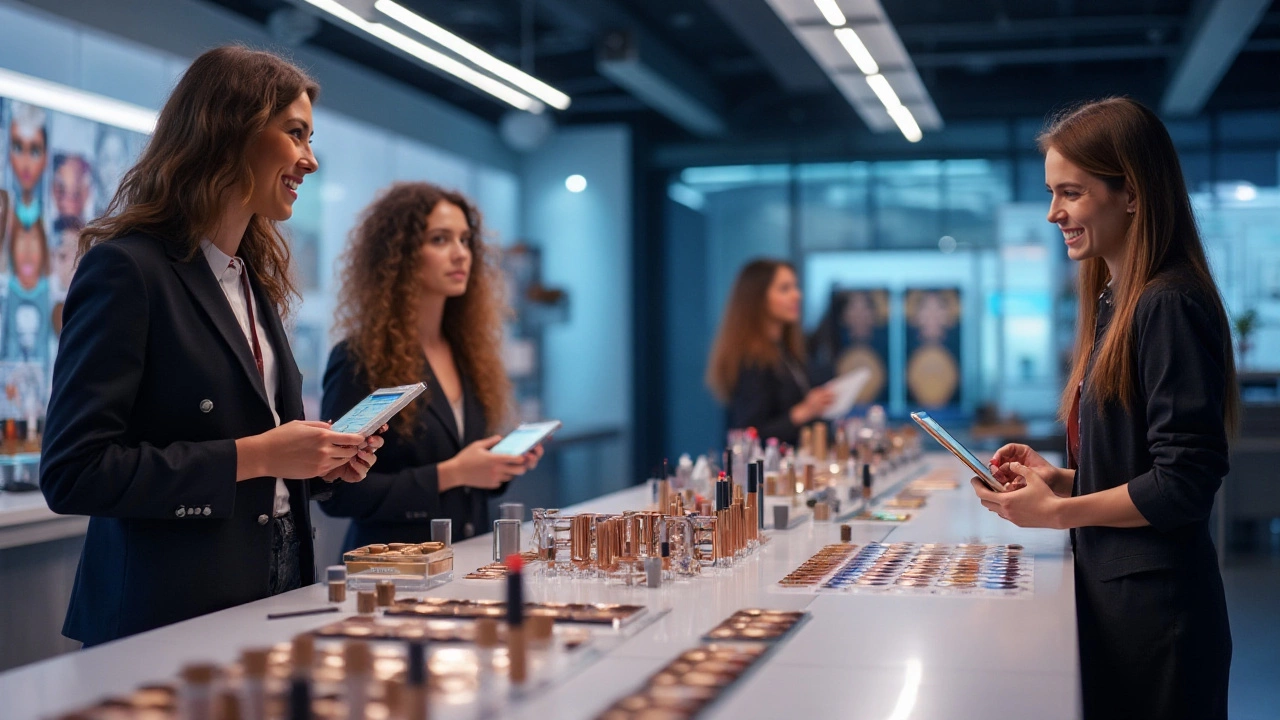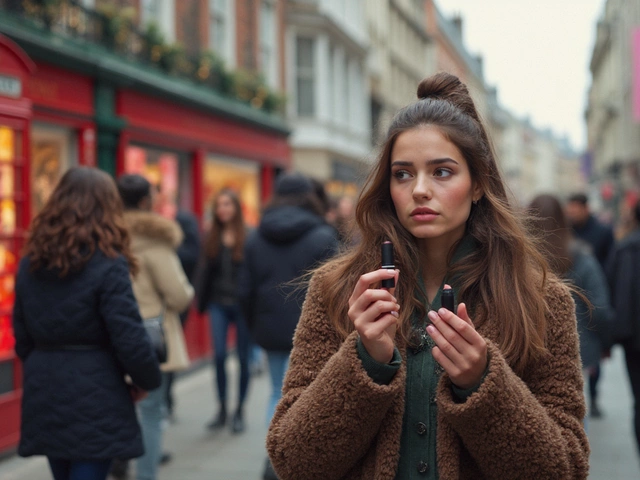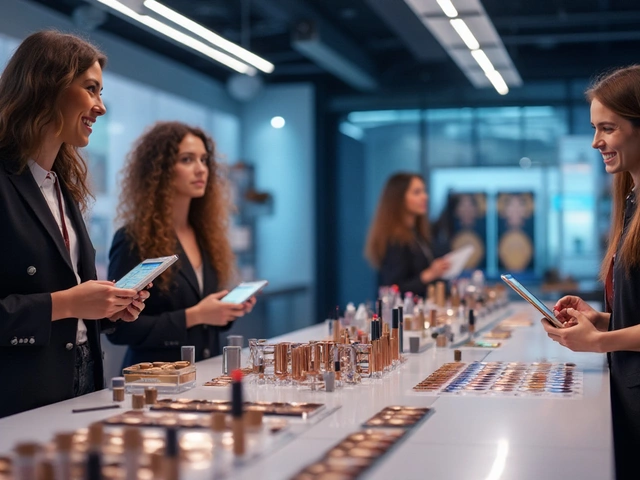In the vibrant world of cosmetics, staying ahead of the game requires more than just a pretty palette. With consumers becoming increasingly savvy and demanding, makeup brands must adapt swiftly to stay relevant in 2025. Whether it's innovative formulations or effective marketing, success hinges on several pivotal factors. Let's take a deep dive into the brands that have captured the hearts and makeup bags of enthusiasts worldwide.
Historically, the cosmetics industry has been a dynamic playground where creativity meets commerce. Brands battle for consumer loyalty, and those that rise to the top often blend tradition with cutting-edge innovation. In this ever-changing landscape, finding the most successful makeup brand can seem daunting. However, by examining what's inside consumers' bags this year, we can discern which brands are truly at the forefront. Follow along as we explore the top names in the industry and what makes them shine so brilliantly.
- Evolution of Makeup Brands
- Key Factors of Success in Cosmetics
- Top Makeup Brands in 2025
- Consumer Favorites and Trends
- Future of the Cosmetic Industry
Evolution of Makeup Brands
The journey of makeup brands from humble beginnings to becoming pivotal players in the cosmetics industry is a fascinating tale of innovation and transformation. In the early days of modern cosmetics, brands like Max Factor and Elizabeth Arden helped shape beauty standards that would prevail for decades. They introduced makeup as an essential part of a woman's daily routine, not just a luxury for the elite. During the mid-20th century, these brands expanded their lines to include foundations, lipsticks, and mascaras that still influence today's beauty essentials.
Fast forward to the late 20th century, the birth of iconic brands like MAC and Bobbi Brown marked a significant milestone. These brands challenged conventional beauty norms by embracing diversity and inclusivity in their product lines. MAC, for instance, became renowned for its vivid color palettes suitable for all skin tones, while Bobbi Brown emphasized a natural look, focusing on enhancing one's features rather than masking them. This era brought about a seismic shift in how makeup brands marketed themselves, with a strong emphasis on celebrating individuality.
As we entered the digital age in the early 21st century, makeup brands had to adapt to a rapidly changing marketplace. Social media revolutionized the way beauty products were marketed and consumed. Instagram and YouTube became crucial platforms where influencers and beauty gurus thrived, creating unprecedented exposure for brands both old and new. Indie brands like Fenty Beauty took advantage of these platforms to reach millions, resonating with consumers seeking products that genuinely reflected their personal identities. A quote from makeup mogul Rihanna encapsulates this transformation:
"I wanted everyone to feel included. That meant that everyone in the world should be able to find their shade in Fenty."
Today, the landscape continues to evolve with a trend toward sustainability and ethical production. Consumers demand transparency about what goes into their products and the impact on the environment. As a result, many leading makeup brands have pledged to reduce waste and source ingredients responsibly. This shift has opened the door for clean beauty brands such as Tata Harper and Ilia, which pride themselves on eco-friendly practices without compromising on quality or performance. For those who thought beauty was skin deep, today's brands are proving that what's beneath the surface truly matters, now more than ever.
One of the current trends shaping makeup brands in 2025 is the advent of personalized beauty solutions. With advancements in AI technology, companies are offering customized skincare and makeup recommendations that cater to individual needs. These tech-driven innovations are not only personalizing consumer experiences but also pushing the boundaries of product development. Brands that effectively harness this technology are poised to lead the industry in the coming years, providing answers to demands of uniqueness combined with efficiency.
Key Factors of Success in Cosmetics
The allure of the makeup industry is undeniable, with thousands of brands vying for a coveted spot at the top. But what truly differentiates the leaders from the rest? One of the primary keys to success resides in a brand’s ability to innovate while maintaining quality. Companies that continuously invest in research and development often reap the rewards. The constant pursuit of novel ingredients, sustainable packaging, and cutting-edge technology keeps these brands attractive to the modern consumer who is discerning and well-informed about their choices.
Effective marketing strategies also play a crucial role. Harnessing the power of social media influencers and organic customer testimonials can catapult a brand into cult status overnight. As beauty clientele frequently look for validation from their favorite influencers, the importance of partnering with these personalities cannot be overstated. An influencer’s stamp of approval can sometimes be seen as a seal of approval that many consumers trust with enthusiasm.
Brand transparency has emerged as a substantial component of brand trust and success in today’s cosmetic landscape. Consumers now demand to know the origins of their makeup brands, how it's sourced, and the ethical implications of its production. The growing awareness around cruelty-free products and environmentally friendly initiatives is shaping the makeup industry in a very profound way. Brands that stay ahead are those that commit earnestly to their environmental responsibilities.
"Success in the cosmetics industry often hinges on a brand's ability to align itself with broader societal values and consumer ethics," remarks Lisa Eldridge, a respected voice in the realm of beauty journalism.
Another significant factor is branding and communication. Consumers are naturally drawn to brands that tell a captivating story. This brand narrative must resonate with the values and lifestyles of its target audience. Whether the brand promotes an image of effortless elegance or edgy rebelliousness, the ability to convey a consistent and appealing narrative across all marketing platforms is essential.
| Factor | Importance |
|---|---|
| Innovation | High |
| Marketing | High |
| Transparency | High |
| Branding | Medium |
To cap it off, successful makeup brands do not merely rest on their laurels. They engage with emerging trends and adapt to the shifting winds of the beauty industry. Understanding consumer needs before they become mainstream desires is a hallmark of truly visionary cosmetics industry leaders. Ultimately, it is this blend of responsiveness, innovation, ethical responsibility, and marketing acumen that secures a brand's place in the hearts—and on the vanities—of countless makeup lovers worldwide.
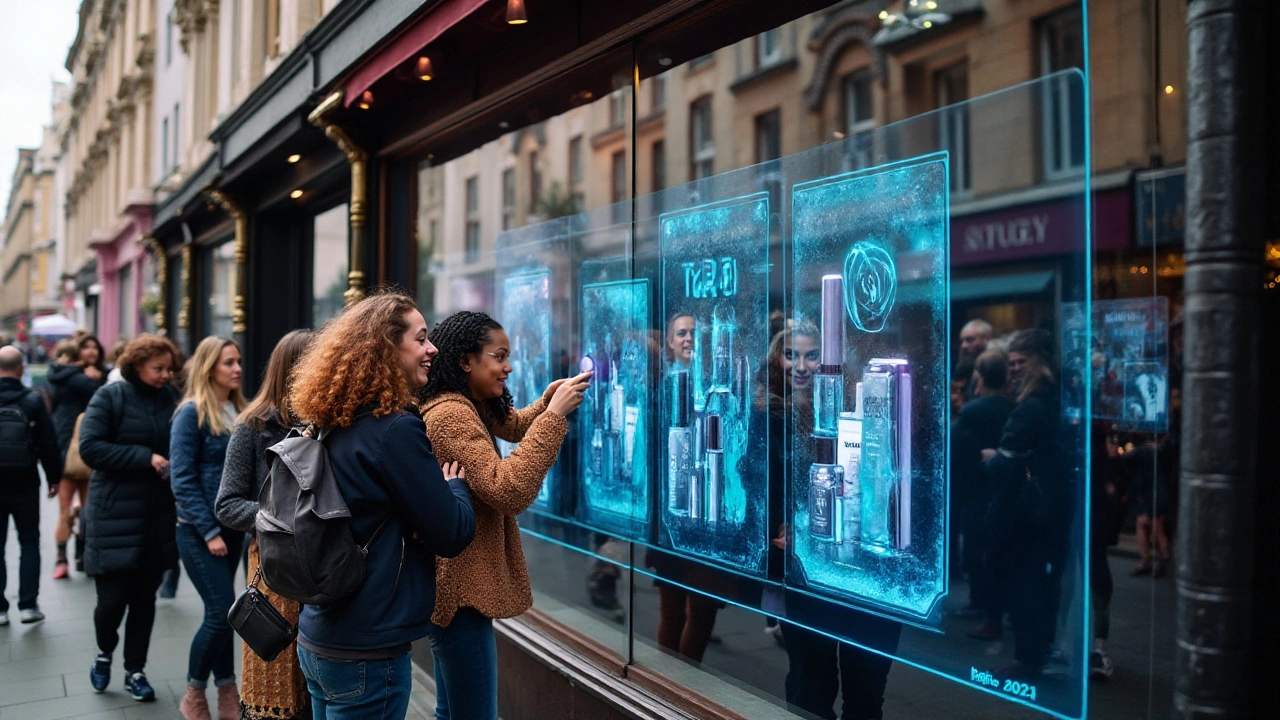
Top Makeup Brands in 2025
The dynamic universe of cosmetics evolves with each year's passing, and 2025 is no different. Today, makeup brands vie for the limelight with a combination of authenticity, sustainability, and innovation. One of the brands leading this charge is Fenty Beauty, which has consistently pushed the boundaries of diversity and inclusivity. Since its launch, Fenty has aimed to set a standard in the industry, offering a wide range of shades that cater to all skin tones. This commitment resonates with consumers who value representation. And it's not just about numbers; the brand's quality formulations continue to win accolades globally.
In the realm of luxury, Chanel continues to be a beacon of timeless elegance. Known for its exquisite packaging and sophisticated hues, Chanel has maintained its appeal by marrying tradition with technology. The brand's initiatives towards sustainability and eco-friendly packaging have also contributed to its positive image. Consumers are more environmentally conscious today, preferring brands that align with their values. Offering refillable packaging options is a move Chanel has embraced, winning over the environmentally adept.
Another prominent player is Glossier, beloved for its "skin first, makeup second" philosophy. This approach has carved out a special niche for Glossier, especially among millennials and Gen Z members who prize minimalist beauty. The brand’s success lies in its community-driven strategies, where customer feedback actively shapes their product development. Glossier's pop-up stores and savvy online presence fuel its air of accessibility and connection, proving that understanding your audience can propel success.
As an industry expert noted, "Brands today are realizing that inclusivity and personalization are non-negotiable components of their success strategy."
On the more playful end of the spectrum, ColourPop continues to dominate. Known for its affordable pricing and vibrant color palettes, ColourPop connects with younger consumers who love to experiment without breaking the bank. Limited edition collections and collaborations with influencers and pop culture icons keep the buzz alive. This savvy understanding of pop culture has catapulted ColourPop into one of the top contenders in the cosmetics industry.
Finally, no conversation about top makeup brands is complete without mentioning the powerhouse that is L'Oréal. With a broad portfolio of brands under its umbrella, L'Oréal sustains a global reach unsurpassed by many. The brand's investment in technology, such as virtual try-ons and AI-powered personalizations, catapults it ahead in the competitive field. It's clear that L'Oréal's blending of science with beauty offers a recipe for continued dominance.
In conclusion, the key for these makeup brands is understanding consumer desires and translating them into practical, high-quality products. As they navigate the ever-evolving landscape, these brands have mastered the art of staying relevant by embracing change, maintaining authenticity, and, most importantly, listening to their audience. Whether it's through innovation, inclusivity, or charisma, the best makeup brands of 2025 show us that success is multifaceted and always within reach.
Consumer Favorites and Trends
As we glance into the makeup drawers and hearts of beauty enthusiasts in 2025, several trends stand out prominently. One such trend is the shift towards sustainable beauty. Consumers, now more than ever, are very conscious of the impact of their purchasing choices on the planet. This has led to an incredible demand for products that not only promise enhanced beauty but also ensure eco-friendly packaging and cruelty-free formulations. Many of the top makeup brands have taken note, launching eco-friendly lines that cater to this burgeoning demographic. The embrace of sustainability goes beyond the product itself, extending to the supply chain and manufacturing processes, which many brands have worked tirelessly to greenify.
Within this trend, there's an emerging focus on inclusivity. Brands are expanding their shade ranges and producing products that cater to every skin tone and type. This inclusivity doesn’t just relate to foundation colors but also to marketing campaigns, featuring diverse models and telling authentic stories that resonate with a global audience. The emphasis on personalized beauty also reflects a trend, with many consumers seeking products that cater to their unique preferences, styles, and needs. This personalization can be seen in the rise of AI-driven beauty consultations offered by leading brands.
Another notable favorite among consumers is the influence of skincare-infused makeup products. As consumers become increasingly health-conscious, the line between skincare and makeup blurs. An increasing number of brands have responded by creating makeup that offers both aesthetic and skin health benefits. BB creams with SPF, vitamin-infused foundations, and hydrating lip color are flying off the shelves. A study recently published in a leading beauty magazine shows that 70% of consumers prefer makeup products with added skincare benefits. This indicates a monumental shift in how consumers define beauty products, no longer just tools for outer transformation but also promoters of inner health.
"The future of makeup lies not in what can just be seen, but in what nurtishes and sustains underneath," noted a renowned beauty editor. "Skincare-infused makeup is not just a trend, it's becoming a staple in everyone’s routine."
Moreover, the digital revolution in the beauty industry cannot be overlooked. Social media platforms remain significant in shaping preferences, where influencers share honest product reviews and create viral beauty trends. Livestream shopping events and virtual try-ons have made it easier for consumers to experience products before purchasing them, greatly influencing their buying decisions. Savvy consumers are now more informed and less reliant on traditional advertising, relying instead on their community's genuine experiences. A deeper dive into these fascinating movements reveals an industry thriving by listening and responding to its audience in profoundly innovative ways.
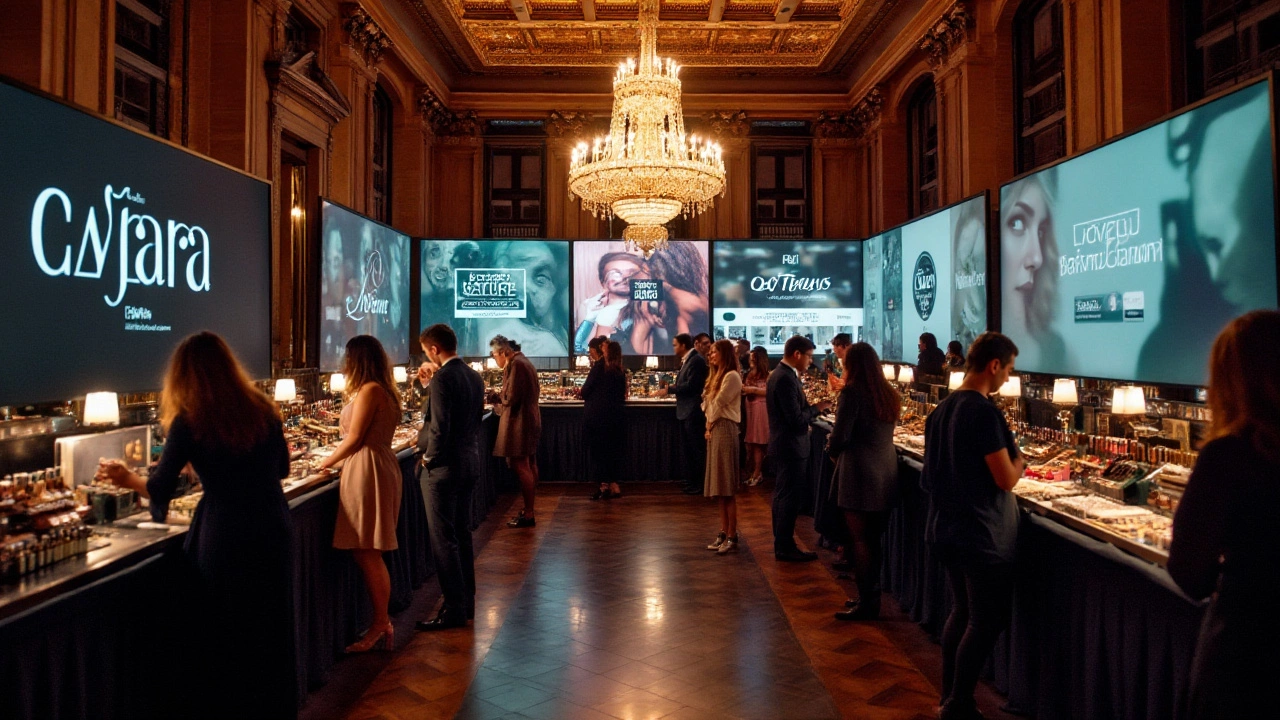
Future of the Cosmetic Industry
The future of the cosmetic industry is gleaming with possibilities, as it continues to intertwine with technology, sustainability, and social consciousness. Brands are increasingly investing in research and development to create products that not only cater to aesthetic appeal but also align with ethical values. The coming years will likely see a rise in products boasting eco-friendly packaging and clean, non-toxic ingredients, driven by growing consumer demand for sustainable practices. As consumers become more discerning, transparency in sourcing and production processes will become critical in building trust and loyalty.
A significant technological shift is underway, with artificial intelligence and augmented reality reshaping how consumers interact with beauty products. Virtual try-ons, once a novelty, are becoming standard practice, allowing customers to see how a shade will look on their skin before making a purchase. This technology can also provide personalized recommendations, enhancing the shopping experience and boosting consumer satisfaction. According to a recent industry report, brands that integrate cutting-edge technology in their offerings see a marked increase in consumer engagement compared to those that do not.
Sustainability is another pillar that will define the industry's trajectory. Consumers are turning to brands with strong social and environmental ethics, prompting many to adopt a circular economy model. Recycling programs and the use of biodegradable materials are increasingly common as companies strive to reduce their carbon footprint. The demand for transparency doesn't stop at ingredients; consumers are asking brands to show how they are making positive environmental impacts. With this shift, brands that prioritize sustainability often find themselves leading the beauty trends.
As the industry evolves, diversity and representation remain at the forefront of consumer expectations. Brands are being called upon to create inclusive product lines that cater to a wide spectrum of skin tones and types. This push for inclusivity isn't limited to products alone but extends to marketing campaigns and the faces of brands. In the words of beauty entrepreneur Rihanna, "Beauty for everyone." This ethos is becoming not just a mantra but a requirement for competing in today's market.
The intersection of e-commerce and social media presents another opportunity for the cosmetics industry. Influencer collaborations, viral trends, and live-selling events on platforms like TikTok and Instagram dramatically shape purchasing behaviors. A strategic social media presence can catapult a brand to fame, as seen with several top makeup brands that have leveraged these platforms effectively. It's this connection with consumers, both online and offline, that will continue to shift and direct industry paths.
In conclusion, the future of the cosmetics industry is bright and varied. With advancements in technology, an emphasis on sustainability, and a commitment to inclusivity, the industry is poised for significant transformation. Brands that anticipate these changes and adapt accordingly are likely to thrive in the years ahead. As we look to the future, it's clear that the dynamic world of beauty will continue to blend innovation with purpose, creating products that resonate with the heartbeats of millions worldwide.
